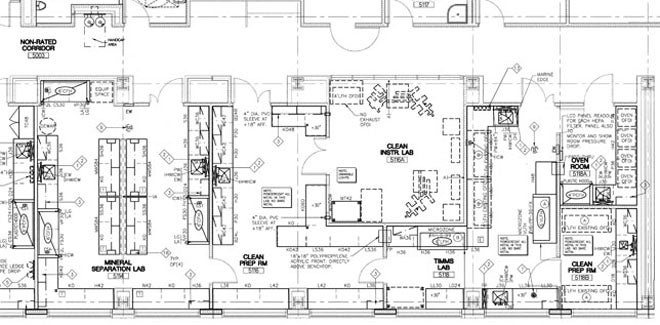
The Isotope Geology Laboratory includes dedicated laboratories for rock sawing and crushing, magnetic and density separations, and a 750 sq. ft. suite of four interconnected clean rooms with a dedicated air handling system to provide climate controlled, cascading positive-pressure HEPA-filtered conditions. A photographic tour and details of the laboratory construction may be found below.
Mass Spectrometry Lab (MG-207C/D)
A temperature (± 1°F) and humidity (>30%) controlled, HEPA filtered, positive pressure room (MG-207C) houses the GV Instruments (now IsotopX) Isoprobe-T thermal ionization mass spectrometer delivered in fall of 2006. Control of the instrument is maintained remotely in an adjoining control room (MG-207D) which also serves as a mineral picking lab and anteroom to the wet chemistry clean laboratories.
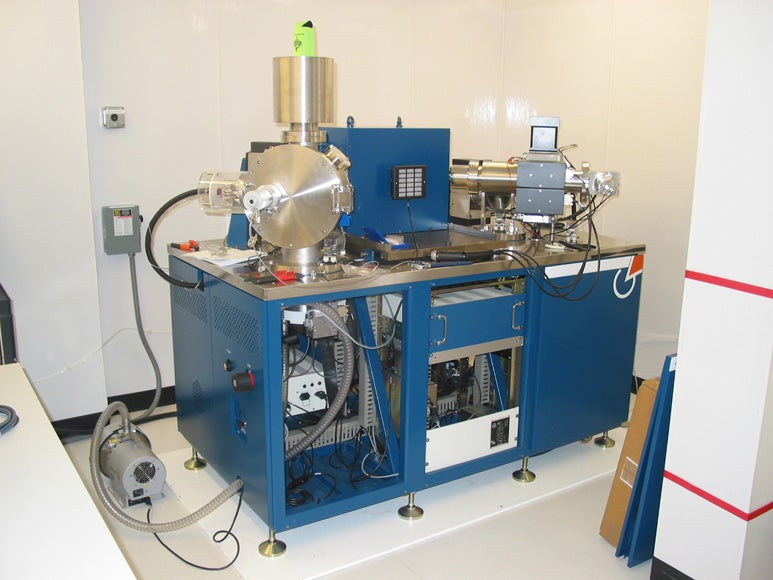
GV Instruments Isoprobe-T multicollector thermal ionization mass spectrometer, a magnetic sector instrument fitted with a 54 cm solid magnet, with 54 cm dispersion at unity magnification. The collector block is fitted with 9 motor-driven fully adjustable Faraday cups arranged as 6 high Mass Faradays, one adjustable Axial Faraday and 2 low mass Faradays, an ion-counting conversion dynode-scintillator-photomultiplier (Daly) detector, and wide-angle retarding potential (WARP) filter positioned between the main collector array and the rear ion counting detector for high abundance sensitivity measurements. The vacuum system is pumped with a Pfeiffer Model TMH521P 520 L/s turbomolecular pump backed by a Varian Model SH-100 scroll pump (source) and two Varian StarCell (40 L/s and 70 L/s) ion pumps (analyzer).
[one_half]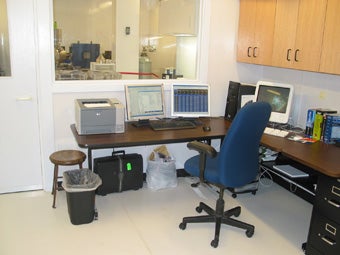 Control room with access and viewing window into mass spectrometry room; room also serves as airlock to clean laboratory (door just off-camera to left).
Control room with access and viewing window into mass spectrometry room; room also serves as airlock to clean laboratory (door just off-camera to left).
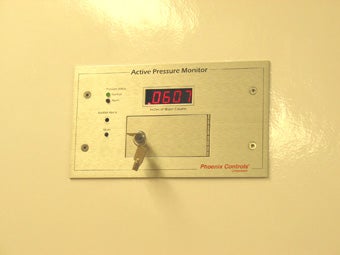
Active pressure sensors monitor cascading positive static pressure drops between all rooms; a variable frequency drive in the air handler maintains these pressure drops as HEPA filters load over time.
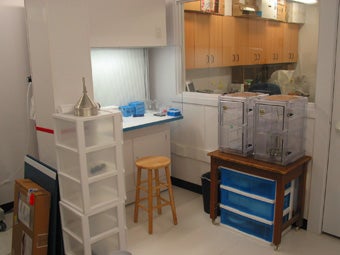
Non-exhausted 4′ ULPA-filtered horizontal laminar flow bench (LM Air Technology) for sample loading and Secador dry boxes for component storage in the mass spectrometry room (window into control room to right).
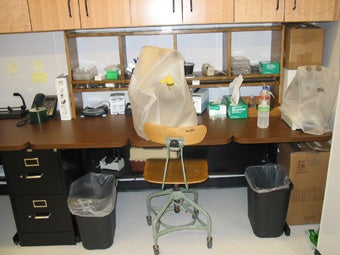 Mineral picking workstation in the control room. A counter with sink and storage are opposite this station.
Mineral picking workstation in the control room. A counter with sink and storage are opposite this station.
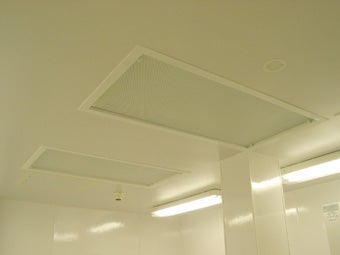
HEPA filter banks at ceiling duct terminations guarantee clean air supply.
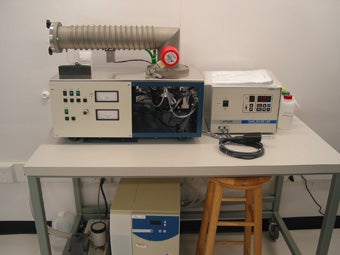
GV Instruments filament outgasser and Miyachi-Unitek Dual Pulse 125 welding station in the mass spectrometry room.
Clean Laboratory (MG-207A/B)
The clean laboratory incorporates design principles successfully used in clean lab facilities operating at the Massachusetts Institute of Technology and the Carnegie Institution of Washington. The two wet chemical labs include:
- a dedicated interior laboratory for ultra-low blank U-Th-Pb chemistry under two six-foot, ULPA-filtered, Class 10 vertical laminar hoods
- a general chemistry laboratory with two six-foot, Class 10, HEPA-filtered horizontal laminar flow acid hoods, and dedicated exhausted bench work spaces for radiogenic isotope sample dissolution and chemical separation, including the Rb-Sr, Sm-Nd, Lu-Hf and U-Th-Pb systems in rock, mineral and water matrices.
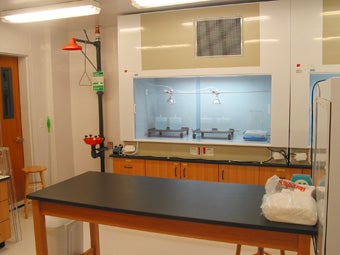
Support equipment in the laboratories include a dedicated Millipore Elix/Milli-Q Gradient ultra-clean water system, quartz and teflon PFA sub-boiling distillation units for ultra-clean reagent preparation, laboratory balances, zoom binocular microscopes, centrifuge, hot plates for low-pressure rock digestion, and a variety of teflon PFA ion chromatographic supports housed in custom-built evacuated acrylic column boxes.
[one_half]
Tracer isotope chemistry clean lab accessed from and at >0.05″ w.c. positive pressure relative to control room. View from door into clean lab (emergency exit at left).
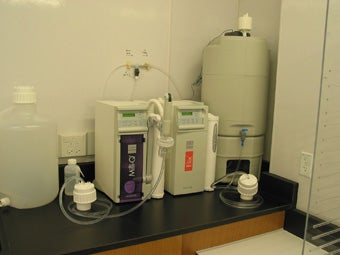
Millipore Elix 5 UV and Milli-Q Gradient ultra-pure water system.
[clear]
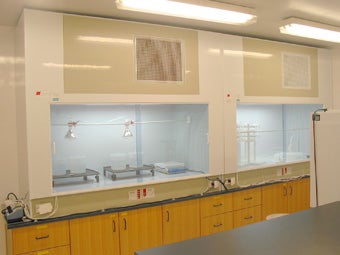
Two HEPA-filtered, exhausted 6′ horizontal laminar flow hoods (side-to-side), for hotplate beaker dissolutions and sample drydowns (left), and reagent purification by sub-boiling distillation (right).
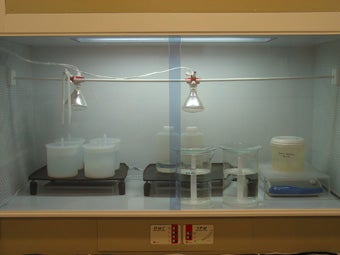
HEPA-filtered hood with custom made hotplates and heat lamps for cleaning, sample dissolution and sample drydown. All wiring is protected in teflon shrink-tubing, and proportional controllers are located outside of the hood.
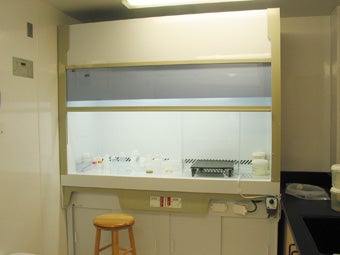
ULPA-filtered, exhausted 6′ vertical laminar flow workstation (Microzone) in interior clean room for geochronology accessed from and at >0.05″ w.c. positive pressure relative to tracer isotope clean lab (door just off-camera to left).
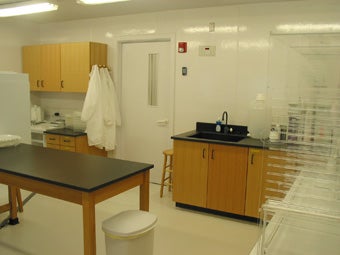
Reverse view of tracer isotope chemistry clean lab, from emergency exit and safety shower.
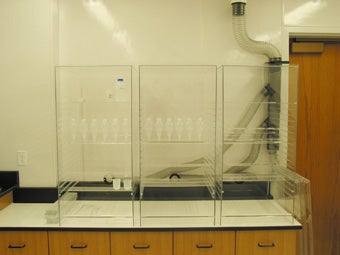
Three exhausted custom-built acrylic column boxes for primary cation separation, and Rb-Sr, Lu-Hf and Sm-Nd clean-up chemistry.
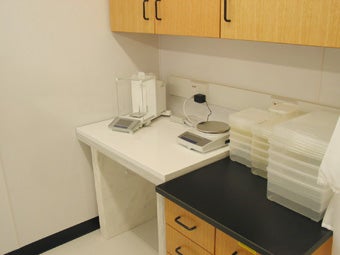
Weighing table with Mettler XS205 and PB1502-S balances.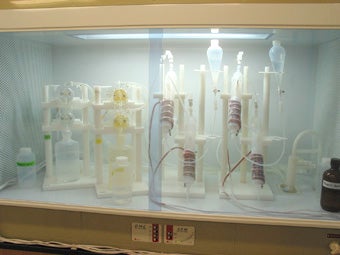
HEPA-filtered hood for reagent purification: two double quartz glass sub-boiling distillation units (Allen Scientific Glass) are used for HCl and nitric acid purification, and two teflon double stills (Savillex) are used for HF and acetone purification.
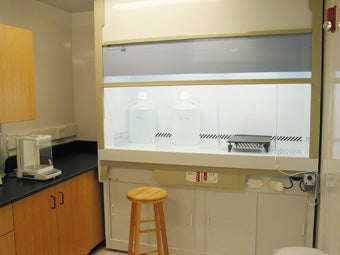
Second of two exhausted 6″ vertical laminar flow workstations (with Mettler AB265-S balance and steromicroscope) for U-Th-Pb accessory mineral and other microcolumn chemical separations. A curtain of air isolates the interior of the hood from the laboratory.
Support Equipment and Labs
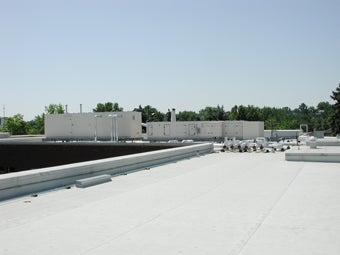
The clean laboratory and mass spectrometry facility is served by an independent, dedicated rooftop HVAC system.
Independent HVAC system servicing the Isotope Geology lab complex.
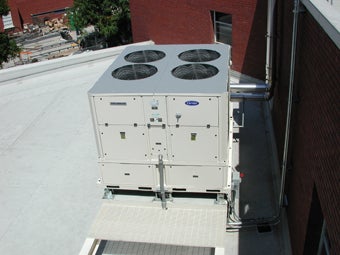
Dedicated 48 ton Carrier chiller.

5000 cfm air-handling unit with heating, cooling and humidification coils, 30% prefilters, carbon fiber filters, and 95% filters. Final HEPA filters are located at duct terminations in laboratories.
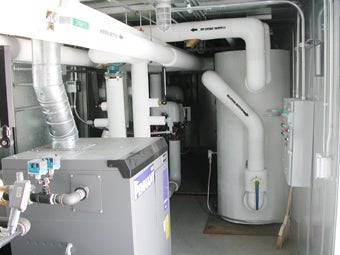
Penthouse containing dedicated boilers, humidifiers and pumps.
A supporting laboratory external to the clean lab suite houses a muffle furnace, and gravity ovens for high-pressure rock and mineral dissolution using Parr acid digestion vessels.
Rock Geochemistry and Mineral Separations Facility
The Department of Geosciences maintains three laboratories for rock sample preparation and mineral separations:
- a full rock cutting facility including a variety of diamond saws, a thin section cut-off saw, grinding wheels, and impregnation equipment for thin section and mineral mount preparation;
- a full rock crushing, powdering and first-stage mineral separation facility including a large and small Bico jaw crushers, a Bico rotary disc mill, shaker sieves, and Rogers water table for mineral separation; and a Spex ball mill and Shatterbox with alumina grinding vessels for geochemical powder preparation;
- a combined acid dissolution lab with exhausted fume hood for biogenic phosphate separation, and second stage mineral separations facility, including a Frantz Isodynamic Magnetic Barrier separator, exhausted fume hood for heavy liquids separation, and a specially-designed high-power ultrasonication and two-stage vortical washing device for the separation of heavy minerals from clay-rich volcanic tuff samples.